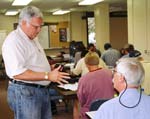
The Interstate Training Advantage
New England Commission explores the virtues of a regional approach
- By Stephen Hochbrunn, Emma Downs
- May 20, 2009
In the water and wastewater treatment fields, a well-trained workforce is essential. That creates a need for high quality training programs offered at a reasonable cost. How best to provide the right training at the right price? One organization—the New England Interstate Water Pollution Control Commission—has shown that there are advantages to approaching the need for training, and the ways to meet that need, from a regional perspective.
Established by Congress in 1947, NEIWPCC is a not-for-profit interstate agency that serves its member states—Connecticut, Maine, Massachusetts, New Hampshire, New York, Rhode Island, and Vermont—in many ways. Its services include coordinating workgroups that encourage cooperation among the states and developing widely used technical guides. Since the late 1960s, the commission also has been in the training game and has earned several accolades for a job well done.
 |
Charles Conway, NEIWPCC's manager of Training Operations, conducts a training session in Rutland, Vt. |
The latest recognition came at the 2007 National Operator Trainers Conference, where NEIWPCC received the Clean Water Act Section 104(g) Spark Plug Award. The award recognizes exceptional efforts to support the 104(g) program, through which the U.S. Environmental Protection Agency provides funding for training at publicly owned wastewater treatment plants treating less than 5 million gallons per day.
"NEIWPCC is able to leverage all of the New England states to pool their resources to maximize training opportunities and to get the best people actively involved," wrote Dave Chin, EPA New England's 104(g) coordinator, in a letter nominating the commission for the award. "The states continue to perform their CWA 104(g) work diligently, but it is greatly enhanced due to the efforts of NEIWPCC."
Flexibility is a hallmark of the commission's approach. While it develops some programs that are state-specific, the majority are created with the needs of more than one state in mind. Therefore, a program originally offered in one state can easily be adapted to work in other states with little or no development cost. And by having NEIWPCC develop and conduct courses that work well wherever they are offered in the region, state agencies and training centers are freed up to focus on very specialized training needs.
A regional approach offers yet another advantage—the ability to use the best trainers in any location, irrespective of state boundaries. For instance, NEIWPCC can arrange and conduct a training program in Vermont using a trainer from Maine and vice versa. The program attendees get the best training possible—as well as the healthy new perspective that an out-of-state trainer can provide—without any additional cost. NEIWPCC receives some EPA funding to administer its training program and thus is able to absorb the occasional extra costs associated with conducting regional programs, such as instructor travel expenses.
These capabilities as well as the shrinking of state coffers have enticed some states, such as Massachusetts and Rhode Island, to let NEIWPCC handle most of their training needs. Because NEIWPCC is a congressionally authorized interstate agency, states can easily enter into agreements with it.
"It has been easy for us to take the little money we get from federal funding and let NEIWPCC use it to manage and coordinate our training," said Bill Patenaude, a principal engineer with Rhode Island's Department of Environmental Management. "For us, training would be a complex process with grant packages, and it would take time away from other important things. NEIWPCC is like one-stop shopping. We work out a training agreement, and they make the training we need happen."
The commission offered its first training program in 1968 following a survey showing more than 30 percent of wastewater treatment plant operators in New England had received no formal training for their jobs. During the first two years of the program, NEIWPCC offered eight courses but the reach was already regional. The courses, which were conducted at a site in Topsfield, Mass., attracted more than 200 operators, who came from all six states.
A lot has changed since then. As training requirements for treatment plant operators became more stringent, NEIWPCC commensurately increased the size of its program. In its 2008 fiscal year (Oct. 1, 2007-Sept. 30, 2008), NEIWPCC coordinated 132 courses for more than 2,600 students. Twenty-five different instructors taught the classes in 63 separate locations in New England and New York state.
A lot of work goes into deciding what training should be offered. To keep the courses fresh and relevant, trainers scrutinize attendee evaluation forms and seek input from sources such as NEIWPCC's 104(g) Workgroup and the Massachusetts Training Advisory Committee. New ideas are encouraged and embraced. For example, the commission now offers an on-line training course and recently worked with Rhode Island regulators to develop and conduct a 10-month wastewater management "boot camp" for 14 operators identified as having management potential.
"NEIWPCC is not afraid to try new things," Patenaude said. "They say let's make it work. They work with us to develop what we need, and [they] don't let the training go stale."
In recent years, NEIWPCC also has taken over the certification of wastewater personnel for Massachusetts and Maine. This includes coordinating and administering the states' certification exams, which are offered twice a year. The advantage to having the commission handle both training and certification is that the certification fees can subsidize the cost of the training. By working with NEIWPCC, the states save money and benefit from the lessons learned over decades of training.
"By taking a regional approach to training and technical assistance," said Tom Groves, director of wastewater and onsite programs at NEIWPCC, "we feel we've been able to accomplish a great deal with a relatively small amount of funding."
About the Authors
Stephen Hochbrunn, a former print and television journalist, is NEIWPCC's communications manager.
Emma Downs is a NEIWPCC intern. She will begin graduate studies in chemistry this fall at the University of Oregon.